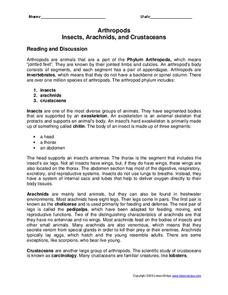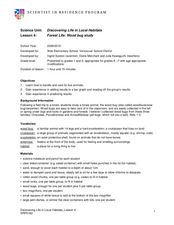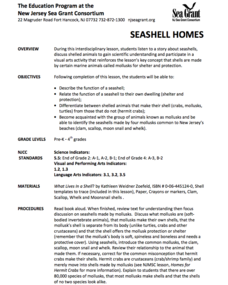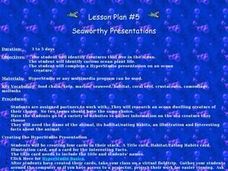Curated OER
Crustacean Critters
Young scholars explore the habitats of hermit crabs. In this crustacean lesson, students discover what animals need to survive. Working with live hermit crabs, young scholars explore how hermit crabs have adapted to their habitats.
Curated OER
The Eyes Have It!
Reading essays about deep-sea expeditions open this instructional activity on crustacean vision. Marine biology explorers study the compound eye and then complete a worksheet in response to all they have discovered. Although the...
Curated OER
Arthropod Coloring
In this arthropod worksheet, students compare and contrast the different animals found in the Phylum Arthropoda: insects, arachnids, and crustaceans. Students complete 8 fill in the blank statements and color illustrations.
Curated OER
ANIMALS OF ANTARCTICA
Students are introduced to the animals of Antarctica and how they adapt to their environment and the changes of the seasons after being read the story,"Counting Penguins" . They pick an animal and predict how he/she thinks this animal...
Curated OER
Arthropods, Insects, Arachnids, and Crustaceans
In this biology worksheet, students read about arthropods and some of the different species that fit into this classification. They then answer 13 questions about what they just learned. The answers are on the last page of the packet.
Curated OER
Forest Life- Wood Bug Study
Examine wood bugs and their habitat. Learners gather wood bugs and examine their bodies. Then discuss their body parts and how they help them survive. They also predict where they think wood bugs live to then graph the class results.
Curated OER
Fish Parasite Survey
Students count nematodes, cestodes and crustaceans on approximately one-hundred and fifty fish. They fill out autopsy reports for external and internal parasites then complete and discuss guide questions to make inferences about parasite...
Curated OER
Crustaceans
In this science worksheet, students find the words that are related to the subject of crustaceans and the answers are found at the bottom of the page.
McGraw Hill
Arthropods
Are spiders related to crabs? Study the order of arthropods with a reading selection about animal diversity. It provides details about each class within the order, as well as vivid pictures and explanatory charts.
NOAA
Deep-Sea Ecosystems – Life is Weird!
A pool of brine in the deep sea can be up to four times as salty as the surrounding sea water. The deep sea ecosystem relies on chemosynthesis and the organisms that live there are often strange to us. The lesson focuses on researching...
Curated OER
Seashell Homes
Pupils listen to a story about seashells. They discuss shelled animals. Learners describe the function of seashell. Pupils relate the function of a seashell to their own dwelling. They differentiate between shelled animals that make...
Curated OER
Hermit Crabs in the Classroom
Young scholars interact with hermit crabs in the their classroom. In this hermit crab lesson, students handle and observe hermit crabs while learning about their habitats and how to treat animals. They watch how the animals move and...
New South Wales Department of Education
Invertebrates
Of all invertebrates, insects by far are the most numerous. Scholars discuss invertebrates and then use a key to classify them. They see different examples and must describe features of each organism based upon the key.
Curated OER
What Lives In A Shell?
Younger students focus on animals and animal habitats in the lower grades. This resource defining habitats focuses on sea animals with shells, but could be augmented to be a richer experience.
Education Outside
Creature Jeopardy!
After conducting research on a given scientific animal name, group members take a walk around their school and look for the specified animals in that classification. Then, they come back to their worksheets and create five creative clues...
Curated OER
Isopod Behavior, of the Rolly Polly Lab
Young scholars investigate the behavior of isopods. In this isopod lesson plan, students make observations of an isopod and sketch the pillbug. They study the orientation of the isopods in relation to moisture in a chamber they construct...
Curated OER
Survival Zone: The Intertidal Zone
Students determine water level tidal predictions for a given place for the next month, current status of the area and the local weather. Links are provided for the information. Students answer questions based on the information found,...
Curated OER
Oceans in Motion
This simple activity introduces children to basic marine life as well as to show them the necessity of protecting aquatic environments. Some famous marine life animals are introduced via vocabulary words, then children cut out pictures...
Curated OER
Invertebrate Diversity
Comparative anatomy prevails in the lesson exploring diversity among invertebrates. Biologists examine physical characteristics of an earthworm from phylum annelida and a meal worm from phylum insecta. They also inspect a cricket and a...
Curated OER
Wild Arctic
Students explore key terms, including food web and food chain. They discuss Arctic plants and animals, devise at least three Arctic food chains and create a food web showing connections among Arctic life.
Curated OER
Beach Life: Spanish Banks Field Trip
Students discover beach life. In this beach life lesson, students visit a beach to find plant and animal species that live there. They discuss the life cycle and needs of some of these animals through a variety of activities.
Curated OER
Trout Are Made of Trees Crayon Mural
Students recognize that for a trout habitat to be ideal, several components must be present. In this trout lesson, students explore what makes a healthy stream. Students create paintings for a mural of a trout habitat. Students uncover...
Curated OER
Seaworthy Presentations
First graders research ocean animals and plants on the web. For this ocean habitat lesson, 1st graders prepare a multimedia presentation. Students will work on their presentations in pairs and every group should have its own animals or...
Curated OER
Crab Multiple Choice Activity
In this crab worksheet, students complete a ten question multiple choice activity pertaining to crabs. Prior knowledge of crabs is assumed.

























